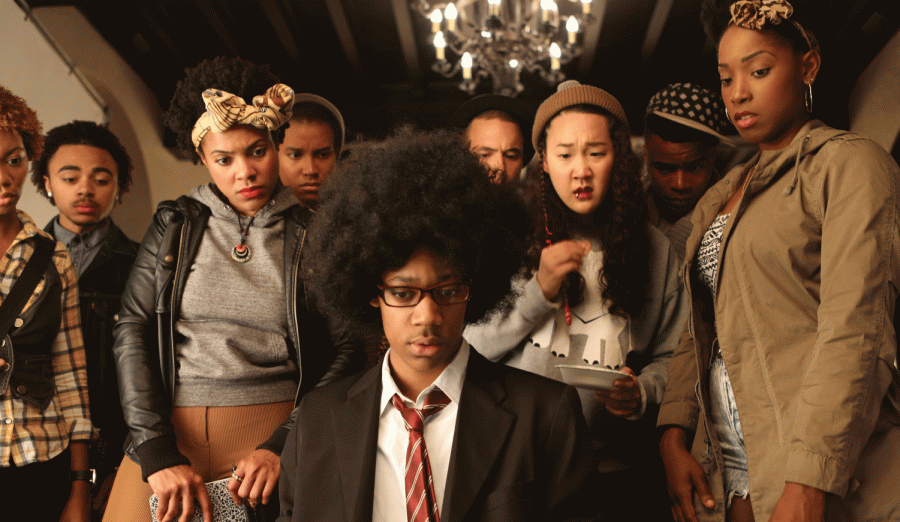‘Dear White People’: Contemporary Film Evokes Greater Conversation About Race
It was standing-room-only in Golden Auditorium on Friday, January 30, at 5 p.m., just before the evening’s first screening of “Dear White People.” The film, a 2014 Sundance Film Festival winner directed by Justin Simien, examines the black identity during a time of high racial tension at a predominantly white, elite, private (and fictional) institution called Winchester University. This exploration of the black experience at an institution not unlike Colgate was sponsored by the Africana, Latin-American, Asian-American and Native America (ALANA) Cultural Center, Africana and Latin American Studies, the Black Student Union and Sisters of the Round Table. Members of the Colgate community served on a panel directly following the film screening, offering insights about the film’s underlying messages, its relevance to their personal lives and its place among the current discourses of race relations.
“Dear White People” follows the lives of four black students at Winchester University, where each one struggles with different aspects of their identities. Throughout the film, characters were accused of “not being black enough,” “overcompensating their blackness,” or being “everybody’s angry black chick” or “nose-jobs,” who smooth out the edges of their blackness to comfort their white peers. Within all of these accusations was the idea that the characters were “supposed” to be something – the overarching narratives of acceptable identities. These characters often saw themselves as symbols rather than individuals navigating social spaces and made statements like, “don’t be a stereotype,” “don’t give them the satisfaction,” or that the majority of campus couldn’t vote for “someone like me” for student body president.
Throughout the film, each character lives in constant tension between who they are and what they believe they should represent. The nuance of the film lies within the complexities of these characters and their individual difficulties in navigating white spaces, forced to confront their blackness or “otherness.” Despite the uniqueness of each character, one question connects all four students – can you find a way to be who you really want to be as a black student at a university like Winchester? And more importantly for us, what does that mean for Colgate?
The post-screening panel included individuals from across the Colgate community, including Visiting Assistant Professor of Educational Studies Berlisha Morton, Senior Lecturer in Writing and Rhetoric Suzanne Spring, Assistant Dean and Director of LGBTQ Initiatives Dr. Khristian Kemp-DeLisser, junior Alexandra Davis and sophomore Sharon Nicol. Each of the panel members spoke of the complexity of navigating racialized space, and focused on the “costume” or “mask” that individuals put on to make their way through difficult social territory. But what lies beyond the costume?
“We all struggle in these spaces,” said Professor Morton, who spoke at length about social performance.
Despite the complexities of each
individual’s costume and the discrepancies between “who we are” and “who the world thinks we are,” Morton claimed it all comes down to one question: “how do we talk to each other like human beings?”
Neither she, nor the panel, nor the film, had the answer.
Though the film is mostly about the
identity politics involved in blackness, “Dear White People” climaxes during a race riot at an African-American themed party, the invitations for which urged wealthy white students to “let out your inner Negro.”
Such blatant acts of racism may make the message clear, but in some ways they undermine the subtle and much more common forms of racism that occur today. Nicol claimed that such overt acts like the blackface party are “not the main machine of racism right now.”
Senior Sarah Chen agreed with Nicol’s statement, specifically in regards to racism on Colgate’s campus.
“For Colgate I think… it is important to realize the effects of the more daily racism that occurs,” said Chen. “I don’t think this movie is what Colgate would need to generate enough of a response to really make those who are not already concerned with issues of race and racism become concerned with its history and institutionalized character.”
Clearly, “Dear White People” didn’t
provide the much sought-after answers to difficult race relations – it even served to tokenize other marginalized identities – but how could it? Rather, the film made an important accomplishment in becoming a contemporary cinematic example of the greater conversation about race, power and privilege – a conversation we need to keep having.






